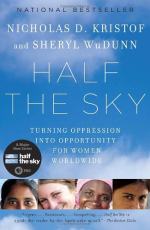|
This section contains 1,008 words (approx. 3 pages at 400 words per page) |

|
Summary
After visiting Bihar, Kristof crossed over from India into Nepal. He was required to fill out some paper work at the border office. They were screening for terrorists and smugglers but not for sex traffickers. There are ways to combat sex trafficking and modern slavery but there is no political will to employ them, the authors point out. While Western men make up a small percentage of the prostitution customers in Thailand, Philippines, Sri Lanka and other locations, most customers or “johns” are local men.
Kristof and WuDunn point out that one reason the modern abolitionist movement has not had significant success is the divisive nature of prostitution. In the 1990s both the left and right politicians passed the Trafficking Victims Protection Act of 2000. The legislation was a milestone in raising international awareness about sex trafficking. However, what represses more progress...
(read more from the Chapter 2: Prohibition and Prostitution Summary)
|
This section contains 1,008 words (approx. 3 pages at 400 words per page) |

|




